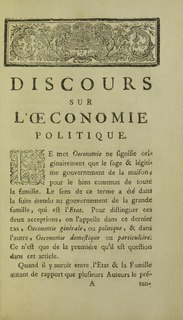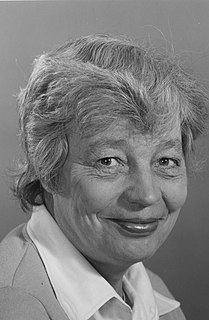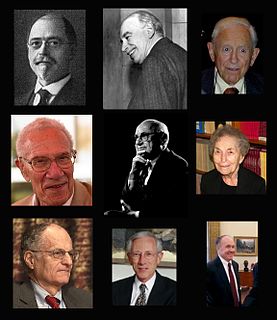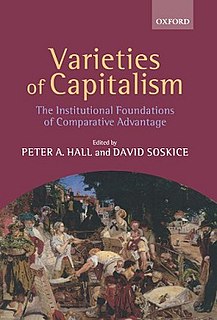Related Research Articles

Economics is the social science that studies the production, distribution, and consumption of goods and services.

Political economy is the study of how economic systems and political systems are linked. Widely studied phenomena within the discipline are systems such as labour markets and financial markets, as well as phenomena such as growth, distribution, inequality, and trade, and how these are shaped by institutions, laws, and government policy. Originating in the 16th century, it is the precursor to the modern discipline of economics. Political economy in its modern form is considered an interdisciplinary field, drawing on theory from both political science and modern economics.

Post-Keynesian economics is a school of economic thought with its origins in The General Theory of John Maynard Keynes, with subsequent development influenced to a large degree by Michał Kalecki, Joan Robinson, Nicholas Kaldor, Sidney Weintraub, Paul Davidson, Piero Sraffa and Jan Kregel. Historian Robert Skidelsky argues that the post-Keynesian school has remained closest to the spirit of Keynes' original work. It is a heterodox approach to economics.
Monetary economics is the branch of economics that studies the different competing theories of money: it provides a framework for analyzing money and considers its functions, and it considers how money can gain acceptance purely because of its convenience as a public good. The discipline has historically prefigured, and remains integrally linked to, macroeconomics. This branch also examines the effects of monetary systems, including regulation of money and associated financial institutions and international aspects.
International political economy (IPE) or Global political economy (GPE) is the study of interactions between the economy on a global level and political and economic actors, systems and institutions. More precisely, IPE/GPE focuses on global economic governance, through studies of macroeconomic phenomena such as globalization, international trade, the monetary and financial system, international inequality, and development, and how these are shaped by, amongst others, international organizations, multinational corporations, and sovereign states.

John Leonard Eatwell, Baron Eatwell, is a British economist who was President of Queens' College, Cambridge, from 1996 to 2020. A former senior advisor to the Labour Party, Lord Eatwell sat in the House of Lords as a non-affiliated peer from 2014 to 2020, before returning to the Labour bench.
International economics is concerned with the effects upon economic activity from international differences in productive resources and consumer preferences and the international institutions that affect them. It seeks to explain the patterns and consequences of transactions and interactions between the inhabitants of different countries, including trade, investment and transaction.
Raveendra Nath "Ravi" Batra is an Indian-American economist, author, and professor at Southern Methodist University. Batra is the author of six bestselling books, two of which appeared on The New York Times Best Seller list, with one reaching No. 1 in late 1987. His books center on his idea that financial capitalism breeds excessive inequality and political corruption, which inevitably succumbs to financial crisis and economic depression. In his works, Batra proposes an equitable distribution system known as Progressive Utilization Theory (PROUT) as a means to not only ensure material welfare but also to secure the ability of all to develop a full personality.

Susan Strange was a British scholar who was "almost single-handedly responsible for creating international political economy." Notable publications include Sterling and British Policy (1971), Casino Capitalism (1986), States and Markets (1988), The Retreat of the State (1996), and Mad Money (1998).
Benjamin Jerry Cohen is the Louis G. Lancaster Professor of International Political Economy at the University of California, Santa Barbara. At UCSB, where he has been a member of the faculty since 1991, he teaches undergraduate and graduate courses on international political economy.
Cultural economics is the branch of economics that studies the relation of culture to economic outcomes. Here, 'culture' is defined by shared beliefs and preferences of respective groups. Programmatic issues include whether and how much culture matters as to economic outcomes and what its relation is to institutions. As a growing field in behavioral economics, the role of culture in economic behavior is increasingly being demonstrated to cause significant differentials in decision-making and the management and valuation of assets.
Colin Hay is Professor of Political Sciences at Sciences Po, Paris and Affiliate Professor of Political Analysis at the University of Sheffield, joint editor-in-chief of the journal Comparative European Politics. and Managing Editor of the journal New Political Economy.

Macroeconomic theory has its origins in the study of business cycles and monetary theory. In general, early theorists believed monetary factors could not affect real factors such as real output. John Maynard Keynes attacked some of these "classical" theories and produced a general theory that described the whole economy in terms of aggregates rather than individual, microeconomic parts. Attempting to explain unemployment and recessions, he noticed the tendency for people and businesses to hoard cash and avoid investment during a recession. He argued that this invalidated the assumptions of classical economists who thought that markets always clear, leaving no surplus of goods and no willing labor left idle.
New Political Economy (NPE) is a relatively recent sub-school within the field of political economy. NPE scholars treat economic ideologies as the relevant phenomena to be explained by political economy. Thus, Charles S. Maier suggests that a political economy approach: "interrogates economic doctrines to disclose their sociological and political premises [...] in sum, [it] regards economic ideas and behavior not as frameworks for analysis, but as beliefs and actions that must themselves be explained". This approach shapes Andrew Gamble's The Free Economy and the Strong State, and Colin Hay's The Political Economy of New Labour. It also guides much work published in New Political Economy, an international journal founded by Sheffield University scholars in 1996.
In economics, non-convexity refers to violations of the convexity assumptions of elementary economics. Basic economics textbooks concentrate on consumers with convex preferences and convex budget sets and on producers with convex production sets; for convex models, the predicted economic behavior is well understood. When convexity assumptions are violated, then many of the good properties of competitive markets need not hold: Thus, non-convexity is associated with market failures, where supply and demand differ or where market equilibria can be inefficient. Non-convex economies are studied with nonsmooth analysis, which is a generalization of convex analysis.

Stephany Griffith-Jones is an economist specialising in international finance and development, with emphasis on reform of the international financial system, specifically in relation to financial regulation, global governance and international capital flows. She is currently member of the Governor Board at the Central Bank of Chile. She has been financial markets director at the Initiative for Policy Dialogue, based at Columbia University in New York and associate fellow at the Overseas Development Institute. Previously she was professorial fellow at the Institute of Development Studies at Sussex University. She has held the position of deputy director of International Finance at the Commonwealth Secretariat and has worked at the United Nations Department of Economic and Social Affairs and in the United Nations Economic Commission for Latin America and the Caribbean. She started her career in 1970 at the Central Bank of Chile. Before joining the Institute of Development Studies, she worked at Barclays Bank International in the UK. She has acted as senior consultant to governments in Eastern Europe and Latin America and to many international agencies, including the World Bank, the Inter-American Development Bank, the European Commission, UNICEF, UNDP and United Nations Conference on Trade and Development. She was also a member of the Warwick Commission on international financial reform. She has published over 20 books and written many scholarly and journalistic articles. Her latest book, edited jointly with José Antonio Ocampo and Joseph Stiglitz, Time for the Visible Hand, Lessons from the 2008 crisis, was published in 2010.

Varieties of Capitalism: The Institutional Foundations of Comparative Advantage is a 2001 book on economics, political economy, and comparative politics edited by political economists Peter A. Hall and David Soskice.
Eric Helleiner is an author and Professor of Political Science and the Faculty of Arts Chair in International Political Economy at the University of Waterloo, and a Professor at the Balsillie School of International Affairs. He holds a Ph.D. and M.Sc. from the Department of International Relations of the London School of Economics, and received a B.A. in Economics and Political Science from the University of Toronto.
Frank Trentmann is a professor of history in the Department of History, Classics and Archaeology at Birkbeck College, University of London. He is a specialist in the history of consumption.
Simon Clarke is a British sociologist specialising in social theory, political economy, labour relations, and the history of sociology. He has a particular interest in employment relations in China, Vietnam, and the former-Soviet nations. He is Professor Emeritus of Sociology at the University of Warwick.
References
- ↑ Selected publications
- ↑ Berry, C (2006) Book Review of 'Foundations of International Political Economy', Millennium - Journal of International Studies 35 (1): 239.
- ↑ Watson, Matthew (2007). The Political Economy of International Capital Mobility. doi:10.1057/9780230592667. ISBN 978-1-349-27964-7.
- ↑ Uneconomic Economics and the Crisis of the Model World. ISBN 9781137385482.
- ↑ Steering Committee of the Standing Conference of Arts and Social Sciences
- ↑ PSA Political Economy Specialist Group
- ↑ University of Warwick, PAIS, Matthew Watson Archived 15 May 2009 at the Wayback Machine
- ↑ Brown Suffers Setback as Britain Extends Recession
- ↑ Buiter, Julius Split on BOE Plan Amid "Sick Man" Tag
- ↑ Templeton Enterprise Article Award Archived 14 August 2009 at the Wayback Machine